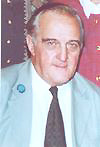
| T H E N I H C A T A L Y S T | M A R C H – A P R I L 2003 |
|
|
|
FOGARTY SCHOLARS |
 |
|
Tadashi
Yamamoto
|
HAPPY RETURNS: TADASHI YAMAMOTO
A visiting fellow from Japan does postdoctoral work from 1977 to 1980 in Ira Pastan’s Laboratory of Molecular Biology, NCI, where he studies the mechanisms of replication of retroviruses and the transformation by Rous sarcoma virus. He and LMB colleagues collaborate on eight scientific papers that elucidate the structure and expression of the collagen gene as well as the role of the cellular matrix in cell growth. In 1981, he returns to his home—to the Institute of Medical Science at the University of Tokyo. And then?
If his name is Tadashi Yamamoto—which it is—he spends the next 20-plus years uncovering the molecular basis of cancer development and becoming an international leader in the cell-signaling and oncogene field. And in 2003, he comes back to Pastan’s lab, this time as a Fogarty Scholar. Yamamoto’s appointment runs from July 1, 2003, through October 31, 2006; he will divide his stay into four three-month visits.
Yamamoto’s achievements include:
![]() Determining the nucleotide sequence of the v-erbB gene of avian erythroblastosis
virus and its role in the induction of sarcoma and erythroleukemia and establishing
that the gene encodes a receptor-type protein kinase–v-ErbB protein, a
part of the EGF receptor–shaping our understanding of the relation of normal
and aberrant cell growth regulation
Determining the nucleotide sequence of the v-erbB gene of avian erythroblastosis
virus and its role in the induction of sarcoma and erythroleukemia and establishing
that the gene encodes a receptor-type protein kinase–v-ErbB protein, a
part of the EGF receptor–shaping our understanding of the relation of normal
and aberrant cell growth regulation
![]() Identifying a homologue of the EGF receptor gene—called c-erbB2—and
establishing that this gene is amplified and overexpressed in various human
tumors and contributes to tumor progression http://tango01.cit.nih.gov/sig/home.taf?_function=main&SIGInfo_SIGID=21
Identifying a homologue of the EGF receptor gene—called c-erbB2—and
establishing that this gene is amplified and overexpressed in various human
tumors and contributes to tumor progression http://tango01.cit.nih.gov/sig/home.taf?_function=main&SIGInfo_SIGID=21
![]() Identifying Lyn and Fyn, novel Src family members, and their various roles in
B-cell activation, autoimmune disease, and central nervous system function
Identifying Lyn and Fyn, novel Src family members, and their various roles in
B-cell activation, autoimmune disease, and central nervous system function
![]() Elucidating the nature and function of a variety of kinases, phosphatases, and
signaling molecules
Elucidating the nature and function of a variety of kinases, phosphatases, and
signaling molecules
His current research focuses on cell cycle regulation and mechanisms of malignant transformation, as well as the roles of protein tyrosine kinases and phosphatases in brain development, especially axon guidance and synaptic plasticity.
As a Fogarty Scholar,
Yamamoto will participate in the LMB gene discovery program. Among his projects
will be analyzing the phenotypic expression of two newly discovered genes—NGEP
and GDEP—in prostate cancer cells. He will also interact especially
with the Cell
Cycle and Immunology
Interest Groups. ![]()
 |
|
David
Weatherall
|
WORLD-CLASS RESEARCH PHYSICIAN: DAVID WEATHERALL
David Weatherall, regius professor of medicine emeritus, University of Oxford, and fellow emeritus, Magdalen College, Oxford, England, has been appointed a Fogarty Scholar for four months in 2003—in April and May and for another two months in the fall.
NHGRI and NIDDK are co-sponsoring Weatherall’s appointment, and the Fogarty International Center (FIC) is providing his base of operations at the Stone House.
The author of 13 books, published between 1967 and 1997, as well as hundreds of chapters and articles, Weatherall is credited by NHGRI director Francis Collins as being "the recognized authority in the world on the molecular genetics of hemoglobinopathies," whose elaboration of the clinical and molecular features of these disorders was the "model for the general molecular understanding of genetic disease."
Weatherall will speak at the NIH symposium marking the 50th anniversary of the double helix (April 14–15, see April events box), at the FIC 35th anniversary symposium on global health in May, and at the bimonthly meetings of the IC International Representatives Committee.
His involvement with NIDDK, according to NIDDK director Allen Spiegel, will include many speaking engagements on clinical and basic research topics, attending rounds on the clinical hematology services, participating in laboratory projects related to the pathophysiology and treatment of people with sickle cell anemia and thalassemia, and advising the institute on genetic studies of hematologic and nonhematologic disease.
Weatherall, says Spiegel,
is "one of the most knowledgeable, productive, and important research physicians
in the world." ![]()